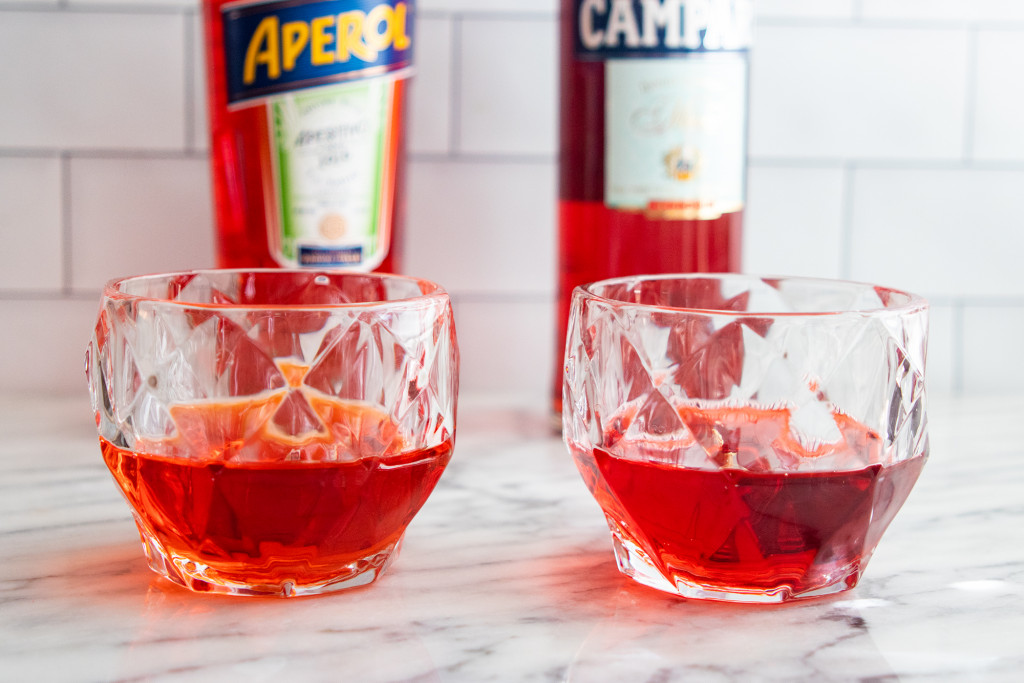Campari and Aperol are two quintessential mixers in the world of Italian cocktails, both with the same color to boot - but are they the same?
We've never shied away from professing our love of an Aperol Spritz (and whoever thinks they should stay in 2017 just isn't living their best life!), and Campari brings the flavor in recipes like Giada's Negroni Sbagliato. Campari and Aperol are two bitter and acerbic Italian liqueurs, most often used as aperitifs - which serve to get your appetite and taste buds ready for a meal ahead. They're both used similarly, they both look the same, they're both Italian - so what's the difference, and how do you know when to drink which?
We're breaking it down in a super-simple format to help demystify any questions you might have and make it a lot easier to choose which one to snag at the liquor store. Plus, a little aperitivo knowledge might just impress your friends as your next social gathering!

1. They don't taste the same... at all!
When you try these two spirits in isolated times, you might totally think they taste the same - especially when their colors are so similar. However, if you were to taste one after the other, you'd surely notice the differences.
Aperol is sweeter and less bitter, and it has a flavor profile of burnt orange, rhubarb, cinchona (a tree with flowers used for increasing appetite) and gentian, a medicinal herb used to help digestion. If you've never tried it, that description surely won't help you understand the flavor (unless you've just so happened to eat cinchona and gentian, in which case, power to you!). To simplify, it has a flavor that starts off sweet on the palette with definite orange flavors - then gets a bit acerbic and sharp at the end, almost reminiscent to the lingering flavor after eating a bitter grapefruit.
Campari, on the other hand, has a much more bitter flavor - and it's much more complex and shrouded in mystery. The company has only revealed that the blend contains "bitter herbs, aromatics and fruit". It's speculated that it contains chinotto, a very sour and bitter varietal of oranges that are grown in Italy. It is also said that it may have cascarilla, a plant used to aid in digestion and nausea. Whatever the secret is exactly, we love the deep, complex flavor that campari offers - especially when paired with something effervescent, light and refreshing like prosecco. However, if you're just getting interested in the world of bitter Italian liquors, Aperol would be our more entry-level, palatable suggestion!
2. They have varying alcohol contents.
If you're looking for a strong cocktail that packs a punch, you might want to reach for the Campari. Depending on which country it's being sold in, the ABV of Campari ranges from 20 to almost 30%, whereas Aperol contains 11% ABV. (Fun fact: it's 15% in Germany!)
3. The colors are actually different.
When put side-by-side, it becomes more evident that Campari has a darker, more deep-red hue. Aperol, on the other hand, has that quintessential bright-orange color - both equally beautiful!
4. They were created 60 years apart from each other.
A man named Gaspare Campari created his namesake liquor in the 1860s, and it was said at the time to contain over 60 natural ingredients including barks, fruit peels, and other aromatics. He ran a cafe in front of the duomo in Milan, and the rest is history. Aperol stepped onto the scene many years later in 1919, created by brothers Luigi and Silvio Barbieri. Fun fact - both liquors are now owned by the Campari Group.
Now that you've gotten your feet wet in the world of Italian aperitivos, check out the links below for some great recipes with Campari and Aperol!















0 comments